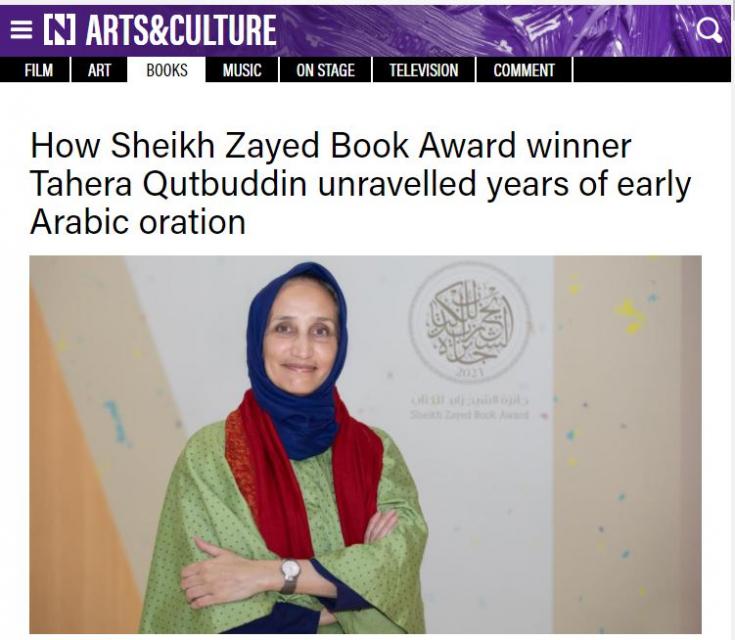In April, Tahera Qutbuddin became the first Indian author to win a Sheikh Zayed Book Award when Arabic Oration: Art and Function received the 2021 prize for Arab Culture in Other Languages, Thenationalnews.com reported.
“Arabic was the language I learnt first,” she tells The National. “I grew up in a Muslim family in India. No one spoke Arabic but we learnt it. My father was an eminent a’lim (Islamic scholar) in India and would regularly teach us in Arabic.”
As part of her lessons, Qutbuddin studied the Hikmah, the sayings of Imam Ali, son-in-law and companion of the Prophet Mohammed. The musicality and arresting quality of the Rashidun caliph’s words fascinated her.
“They were so beautiful,” says Qutbuddin, a professor of Arabic literature and Islamic studies at the University of Chicago. “I’d memorise them and loved them.”
In the late 1980s, when she was studying for her Bachelor of Arts at Ain Shams University in Cairo, Qutbuddin decided to revisit the sermons of Imam Ali in the hope of writing about them, exploring their aesthetics as well as the historical context surrounding them.
She never actualised the idea but it stayed in the back of her mind as she continued her studies, obtaining an MA from Harvard University in 1994 and then a PhD in 1999.
At first, Qutbuddin’s research was exclusively based on Imam Ali’s sermons. However, as she began to hone her analysis of the material, she decided it would be good to read up on the Khutbah, a form of public preaching in Islam.
Speeches by several prominent female figures in the region’s history are also featured in Qutbuddin’s book. In the early Islamic period, she says, there were women who held important roles in society, yet speaking in front of a mixed audience was considered taboo.
“You would only see a woman giving a public speech in a moment of trauma,” she says.
One famous example is a speech by Zaynab, daughter of Imam Ali and granddaughter of the Prophet Mohammed.
The sermon was uttered in 680 AD after the Battle of Karbala, fought between the army of the second Umayyad caliph Yazid and a small army led by Zaynab’s brother Hussein. Zaynab was taken to the Yazid capital in Damascus, along with other survivors of Hussein’s army.
Anguished by the death of her brother and sons, Zaynab made her presence known at the court of Yazid and challenged his victory.
“She chastised him and declared that God was on their side,” Qutbuddin says. “It’s a famous speech and is one of the earliest written texts of Arabic literature called Balaghat Alnisaa.”
The intricate and archaic language used in these sermons was a challenge to unravel, Qutbuddin says. It was partly for this reason that Arabic Oration took 10 years to write.
“I wrote it in bits and pieces,” she says. “I wrote a couple of chapters early on, while my fellowship from the Carnegie Foundation focuses on contemporary works and I used that research to write the final chapter.”
Qutbuddin says she is honoured to be the first Sheikh Zayed Award winner of Indian origin and was delighted with the reaction to the accolade.
“It warms my heart to see how proud India is,” she says. “I think it's a source of joy for them to have one of their own honoured in this way.”

